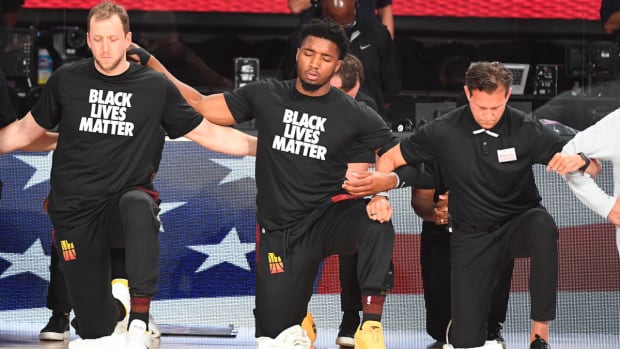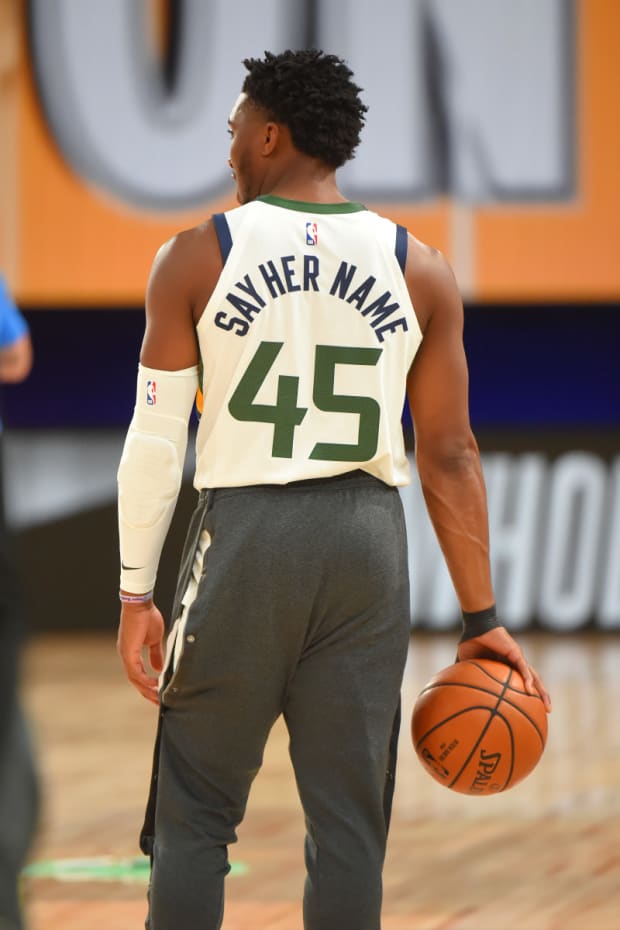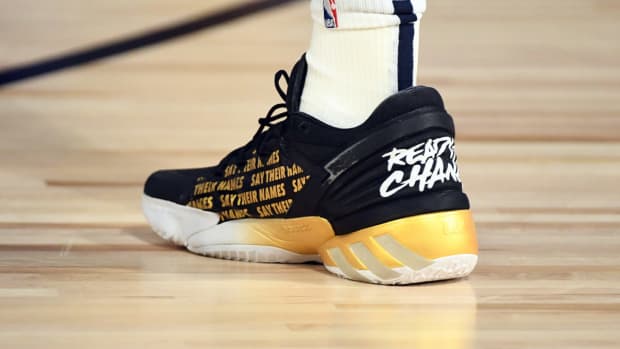The Utah Jazz star is using his platform to shed light on social justice and racism.
When the NBA was planning to return to the court to resume the season after the coronavirus suspension, one of the pressing topics was how would Adam Silver and Co. continue to shed light on issues such as police brutality and systemic racism. Players were concerned that the season would become a distraction that takes away from the current social justice movement. So far the league has tried its best to keep its word by kneeling on the sideline during the pregame national anthem. Coaches, players and referees have worn Black Lives Matter shirts on top of their warmups, and players have been wearing NBA-approved social justice messages on the back of their jerseys.
Most importantly, players have been using the bubble as a platform to be vocal about change and the ongoing issues this country faces. One of the most vocal players in the bubble has been Utah Jazz star Donovan Mitchell. During the first game of the restart, Mitchell wore a bulletproof vest that featured the name of numerous people who were killed because of police brutality. He has also been using his interview time to seek justice and urge people to not forget about the police killing of Breonna Taylor. He also wore a custom version of his new signature sneaker, the Adidas D.O.N Issue 2 on opening night to honor Taylor. Mitchell created a short film, Ready for Change that showcases his commitment to bring these issues to the light.
“Basketball has given me so much and it has allowed me to pursue a dream I had since I was a kid. With that being said, it has also given me a platform,” says Mitchell. “When I speak, I don’t just speak for Donovan Mitchell. I speak for the African Americans and minorities in general because I need to use my platform to address certain things that kids might not have the same voices.”
Sports Illustrated spoke to Mitchell about his film, facing racism, creating change and what’s next in his future.
The following interview has been lightly edited for clarity and brevity.
Jarrel Harris: Why was it important to make the ‘Ready for Change’ film? What are you trying to showcase to the world?
Donovan Mitchell: I think the biggest thing for me, and obviously it's in the title, 'Ready for Change,' I think this is a big moment not just for myself, but with a lot of my fellow athletes just to create change, to spark change. I think that starts with doing what guys like myself have been doing, speaking out on issues, bringing stuff to the front lines that people can see what's been done, showcasing what’s been done and giving our stories, being able to preach our message.
I think working with Adidas, we were able to do that, especially through my shoe and also as a brand and myself as a whole. The NBA as a league has been doing a great job of it. I think you have to understand that the only way change is going to come is by having those uncomfortable conversations. It’s not going to be an easy one for myself. It’s not going to be an easy one for my fellow white counterparts, white people in general. I think the conversation just needs to be had because we’ve been crying for change for so many years. This is a time where we need to act on it and honestly, it’s not even just African Americans, it’s really white people as well, being able to understand and accept that there is social injustice and systemic racism as well.

JH: While the goal in Orlando is to win a championship, how important is to you not to forget about movements like Black Lives Matter and those we lost? How can we keep this energy going?
DM: What I think has been great and what the league has done well is that guys have been able to create a platform where they could speak and continue to do it in interviews during postgame and halftime, and showcase messages on the floor. I think that's going to make it really easy for guys to kind of go out there and hoop and then also have the message kind of be right in front of everybody's face for them to see and not let the message really die. A lot of these things go on for a good month and then go away. I think this hasn’t allowed the media to kind of push it away. We have to continue to voice and create a change while also being competitors and fulfilling our roles as basketball players.
JH: As a young African American man, I have dealt with racism and had uncomfortable moments with police. Have you ever had that experience?
DM: I've actually been in a car where I've been pulled over in college and I was told the only reason why you're not getting a ticket or anything was because, I love your college coach. There was a tweet I saw where somebody said, did you ever wear your college gear as a form of protection? I saw that and that really hit home for me because I wore it everywhere. Especially being in a state like Kentucky, where obviously it’s not as diverse. It’s pretty diverse in the city of Louisville but outside of that, not really much. I was like man I never really thought about that.
Even when I first got to Utah, which is like 2.5% African American and it’s like I am with the Jazz. It’s okay. Don’t be afraid of me. I think that right there in itself is insane to me. I've been pulled over in Utah because of the car I drive and the neighborhood I drive in. The cop took my license and his whole mood changed. He picked on things wrong with my car. So for me when I see these things like the George Floyd murder, it gives you moments to reflect because in the moment you’re not really thinking about it. I was fortunate enough to get out of that situation. It really allowed me to open my eyes and realize things that become normal and second nature to African American men and women that aren't right and what we shouldn’t be fearing every day.

JH: Adidas is big on change and community. How was it working with the brand on this project?
DM: I think it was huge. I’m really blessed that we were able to work on this together. I think for me and for us as a whole, I think the biggest thing is just continuing to spark and create that change. Whether it’s through athletes, through branding messages, through giving back to the community. There's several things that we have done and we’ll continue to do in the community. I don't want to give it all away right now, but I think that it is huge being able to address these problems. Now it’s how do we fix it? How do we continue to show that this isn't right? When you have large corporations, they can be worried about certain things, but we we're like no. We were big on showing what we stand for. This is what we do, and we need to find a way to solve it.
JH: Congrats on your second signature sneaker. Take me behind the process with this one?
DM: We obviously had the D.O.N. Issue #1, which was a great success. I am extremely blessed to be in this position. So with the D.O.N 2, we had more time to figure out what I liked or didn’t like and think about things we could fix. I think the biggest thing that we see in this one is the colorways are insane. I am big on colors and we partnered with Crayola and partnered with Marvel again. I am just excited to be able to give back and really continue to sell it at the same price point. I want to make it accessible to everyone and have kids wear eight different colors if they want to. I think that is something growing up I always wanted and to be able to give that back to kids is truly incredible.

JH: How has your personal brand evolved over the past few years? Did you ever envision something like this for yourself?
DM: No, I didn’t. I have to be honest with you, I've been truly blessed with this opportunity. It’s not just with Adidas, but with Body Armor, New Era, Stance, but there's so many companies that I've been able to work with and be able to partner with.
So I think my brand as a whole has definitely gone in the right direction. It can only go one or two ways. You can either be satisfied with it or continue to build. I'm looking to continue to build and continue to become better. Most importantly, I think the biggest thing is being able to continue to work on the court, because all of this is great, I'm blessed to have all this, but it can be taken away without performing. I fell in love with the game of basketball and that's really where my head is at with that.
JH: What is next for your future? What do you ultimately want?
DM: Honestly, I feel like a championship is the ultimate goal. I love being able to partner with all these different brands, I love being able to have my own shoe. I could have 15 shoes, but I want to win. You grow up seeing the parade. You grow up seeing everybody say, I want to go to Disney World. That's what you want. You know, that's the goal of basketball. And like I said, everything else will kind of fall into place with that as long as you take care of what's most important.
As far as the world, it's a lot you know. I think the biggest thing that we, as a country and as a world need to figure out is understanding that we're all equal. And it sounds crazy to have to say that in 2020, that people still don't think that that's the case, but it is. We need to get to a point where people realize that they had a certain head start in things and opportunities that are open to them compared to a kid growing up in the projects that didn't have things because he just didn't have that visual, the education that you need to learn. I went to public school for about three or four years and I learned in the third and fourth grade, that it was way different from when I went to private school. I think that needs to change because that's really where it starts.
It starts in kindergarten, in first grade, and second grade, being able to at an early age, be taught, it's going to sound funny, but like how to cook, how to manage your time, how to go about your day. I think I was taught all that at an early age, so when I left for college and left to become an adult, it was easier for me.
I think that is the benefit of having that type of stuff. So for me, I think we need to get to a point where education is way more important than it is right now to the world, because that's ultimately what fuels a lot of what's going on. Because you have kids who grow up who haven't been to a different state until they are 18- or 19-years-old, let alone understand how to even go about going about taxes.
There's just a gap and a disadvantage. Ultimately my biggest thing is education and everything else will kind of hopefully fall into place.